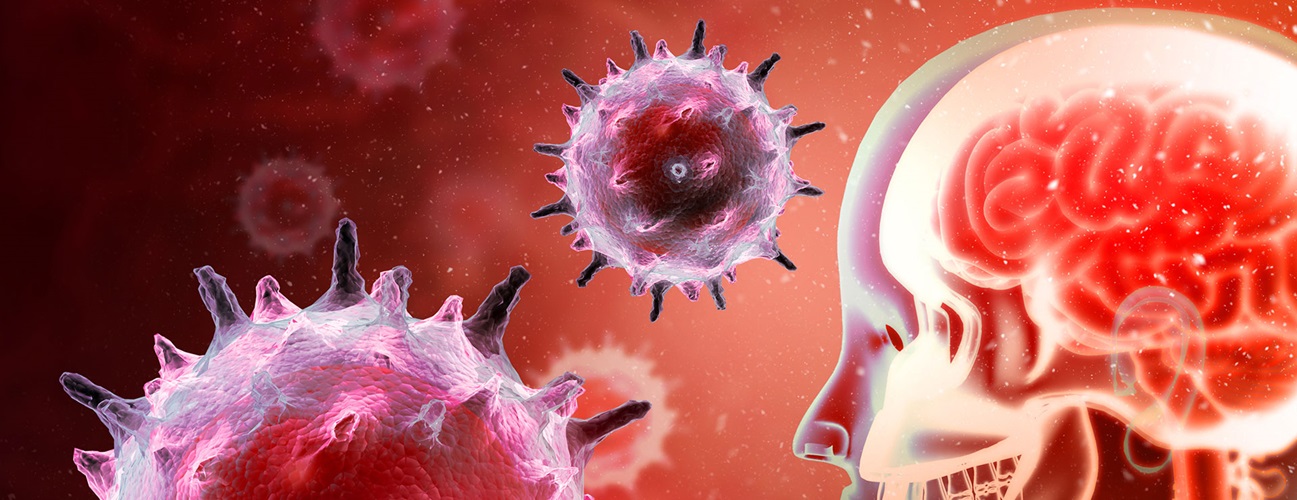Encephalitis
Encephalitis is a serious condition affecting the brain that requires prompt treatment to lower the risk of lasting complications or death.
What You Need to Know
- Symptoms of encephalitis vary depending on the affected area of the brain, but often include headache, sensitivity to light, stiff neck, mental confusion and seizures.
- It’s important to see a doctor promptly if you are experiencing symptoms, which may not seem troubling at the time. Timely diagnosis and treatment are the keys to a successful recovery from encephalitis.
- There are many types of encephalitis, and the causes vary from a viral infection to an abnormal response of the immune system.
What is encephalitis?
Encephalitis is inflammation of the active tissues of the brain caused by an infection or an autoimmune response. The inflammation causes the brain to swell, which can lead to headache, stiff neck, sensitivity to light, mental confusion and seizures.
Encephalitis strikes 10–15 people per 100,000 each year, with more than 250,000 patients diagnosed in the last decade alone in the U.S. The condition can affect anyone, but more often occurs in younger people.
Encephalitis Causes and Types
Encephalitis can be caused by infections or autoimmune conditions where the body’s own immune responses attack the brain. Even with extensive testing, the specific cause of encephalitis remains unknown in about 30%–40% of cases.
Cases of encephalitis are likely to continue to rise as more and more autoimmune causes are recognized. Emerging infections such as Zika, chikungunya and Powassan viruses can also contribute to this trend.
Infectious Encephalitis
Infectious encephalitis is typically caused by a viral infection. Vaccines for measles, mumps, rubella and chickenpox have reduced the rate of encephalitis from these diseases, but other viruses can cause encephalitis. The most common causes of viral encephalitis are herpes simplex virus types 1 and 2, varicella zoster virus and enteroviruses, which cause gastrointestinal illness.
Encephalitis can also result from certain viruses carried by mosquitoes, ticks and other insects or animals such as:
- West Nile virus
- Japanese encephalitis virus
- La Crosse virus
- St. Louis virus
- Equine viruses
- Powassan virus
- Zika
- Chikungunya
Other infectious microorganisms such as bacteria, fungi and parasites can also cause encephalitis, though rarely.
Autoimmune Encephalitis
Autoimmune encephalitis occurs when a person’s own antibodies or immune cells attack the brain. Antibodies may target specific proteins or receptors in the brain, which determine the type of autoimmune encephalitis:
- In anti-NMDA receptor encephalitis, the immune system targets the NMDA receptors in the brain.
- In VGKC-complex antibody encephalitis, the immune system targets the VGKC brain protein complex that includes subtypes LGI-1 and CASPR2.
- GABA-A and GABA-B receptors may also be targeted.
While the causes of autoimmune encephalitis are not well understood, it can sometimes result from a tumor (benign or cancerous). Some types of autoimmune encephalitis such as acute disseminated encephalomyelitis (ADEM) are typically triggered by an infection (post-infectious encephalitis).
Encephalitis Symptoms
Acute encephalitis shows up with an onset of symptoms that get worse over the course of days to weeks. Infectious encephalitis often starts with flu-like symptoms or headache and evolves to altered mental status and problems with thinking, remembering and reasoning. Autoimmune encephalitis typically progresses over the course of weeks.
Symptoms of encephalitis vary according to the area of the brain affected and, in autoimmune encephalitis, depending on the associated antibody.
Physical Symptoms
- Fever
- Seizures
- Headache
- Movement disorders
- Sensitivity to light
- Sensitivity to sound
- Neck stiffness
- Loss of consciousness
In severe cases, encephalitis symptoms may include:
- Weakness or partial paralysis in the arms and legs
- Double vision
- Impairment of speech or hearing
- Coma
Cognitive Symptoms
- Excessive sleepiness
- Confusion and disorientation
- Irritability
- Anxiety
- Psychosis
- Hallucinations
- Memory loss
- Other behavioral changes
- Cognitive impairment
Symptoms Due to Specific Types of Encephalitis
Encephalitis caused by certain infections or autoimmune processes can show up with characteristic symptoms.
- A sensation of déjà vu (the feeling that one is reliving something already experienced) is a common finding in early stages of herpes simplex virus encephalitis.
- A type of autoimmune encephalitis affecting NMDA receptors can start with a flu-like illness. It can then lead to behavioral changes and unusual movement patterns affecting the mouth and face, cognitive decline and impaired function of the autonomic nervous system.
- Another type of autoimmune encephalitis (LGI1) is associated with seizures or other abnormal movement of the face or arm.
The symptoms of encephalitis may resemble other problems or medical conditions. Always consult your health care provider for a diagnosis.
Encephalitis Diagnosis
You may need to be evaluated for encephalitis if you are experiencing a combination of symptoms such as fever, altered state of awareness, seizures or changes in behavior or movement. It is very important to identify encephalitis promptly to decrease the risk of death or lasting complications.
To diagnose encephalitis, your healthcare provider might order tests, perform a medical exam and discuss your medical history. The doctor may ask about your vaccinations, recent colds and other respiratory illnesses or gastrointestinal illness. He or she will want to know if you have recently had a tick bite, have been around pets or other animals, or have traveled to certain locations.
Tests for encephalitis can include:
- Neuroimaging, such as a brain MRI or CT scan
- A lumbar puncture (spinal tap) to check for signs of infection in the brain or spinal cord
- Electroencephalogram (EEG) to look for seizures or specific patterns of electrical activity in the brain
- Blood tests or urine and stool tests to identify organisms or antibodies responsible for an infection
Additional tests may include:
- A sputum culture tests the material that is coughed up from the lungs to see if certain infections are present.
- In rare cases, a biopsy of affected brain tissue may be performed to allow for examination under a microscope.
- Intracranial pressure monitoring (ICP) measures the pressure inside the skull to monitor the brain swelling.
Encephalitis Treatment
The key to surviving encephalitis is early detection and effective treatment of the underlying cause. A team of specialists working together is an important factor in optimal care.
Encephalitis patients might require a stay in the ICU so that health care providers can watch for seizures, brain swelling, respiratory failure or heart rhythm changes.
Encephalitis treatment depends on the underlying cause and symptoms, and may include:
- Antiviral medications to fight viral infections affecting the brain.
- Antibiotics to address underlying bacterial infections causing encephalitis.
- Immunotherapy, such as steroids, intravenous antibodies (IVIg) or plasma exchange, to address certain types of autoimmune encephalitis.
- Medications or other therapies to control seizures.
- A breathing tube, urinary catheter, or feeding tube may be necessary if the person’s encephalitis has caused loss of consciousness.
Patients with encephalitis who have seizures that don’t respond well to anti-seizure medications could benefit from a ketogenic diet, which is high in fat and low in carbohydrates. It has been effective in reducing seizures in drug-resistant epilepsy in children and adults, as well as in patients with autoimmune encephalitis such as anti-NMDA receptor encephalitis.
The Johns Hopkins Encephalitis Center
The Johns Hopkins Encephalitis Center is dedicated to providing expert clinical care for patients with encephalitis. We have established a multidisciplinary group of specialists who work together to improve the diagnosis and treatment of patients with this dangerous and disabling condition.
Encephalitis Prognosis
Encephalitis is very serious. Both the acute stage and the aftermath can be overwhelming for patients and their families.
During the encephalitis attack, the inflamed brain tissue can suffer damage, which varies greatly between patients. In general, the brain doesn’t bounce back as quickly as other body parts such as bone, skin and muscles, but it does have some capacity to recover.
Mild cases of encephalitis are usually short and result in a full recovery. However, despite improvements in diagnosis and treatment, encephalitis still leads to death in about 10% of patients.
Survivors of severe cases of encephalitis can be left with permanent problems such as fatigue, irritability, impaired concentration, seizures, hearing loss, memory loss and blindness.
The recovery process may take months to even years. Intensive rehabilitation, involving specialists in neurology, occupational therapy, speech and language therapy, nutrition and neuropsychology, can help patients make the best possible recovery.
Can encephalitis be prevented?
These measures can help prevent certain types of infectious encephalitis:
- Keep your vaccinations up to date, especially when traveling to areas known to have encephalitis-causing viruses.
- Use proper hygiene and hand-washing to help prevent the spread of viruses and bacteria.
- Avoid mosquito and tick exposure.
If you are exposed to someone with bacterial encephalitis, contact your doctor. You may be offered a course of antibiotics to prevent you from getting the disease.





